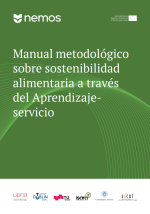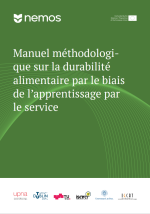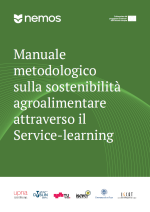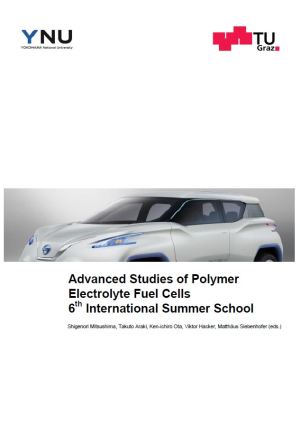Preface:
This interdisciplinary training program for young scientists started as a co-operative project of Graz University
of Technology and the Yokohama National University in the year 2008. The training program grew quickly, both in
the number of participants as well as in the number of participating international experts in the field of fuel cell
research. This proceeding includes short abstracts along with key slides from the presentation of the lecturers of
the 6th International Summer School.
The training program covers research topics in the fields of hydrogen production, basic electrochemistry,
thermodynamics, kinetics and catalysis as well as the design and development of the complete fuel cell systems.
The goals of the training are to provide the necessary theoretical background to the young scientists and to make
the young scientists more aware of the need to work closely with colleagues from different fields such as the
natural sciences and engineering departments in order to successfully develop and implement this technology.
The lectures cover following topics:
•Basic principle of fuel cells
•Basic electrochemistry
•Measurement and Characterization Techniques
•PEFC Lifetime and Degradation
•PEFC Applications
•Hydrogen as Fuel
•Hydrogen Production and Heterogeneous Catalysis
•Advanced Material Studies
In 1839, Schönbein and Grove described the working principle of a fuel cell. Since then, it was often claimed
during a number of fuel cell hypes that fuel cells will soon replace conventional power production technologies. So
why don’t we use fuel cells nowadays in our daily life? “Economic lifetime” might be the shortest answer, although
the commercialization process of residential co-generation systems started in Japan in the year 2009. Currently
are approx. 40,000 systems are in operation with the financial support of the Japanese government. Key industrial
players push the commercialization of electric vehicles and mobile applications, even during times of economic
stagnation. Research institutions and universities are covering all aspects from basic research to system
development in a wide range as never seen before in history. So, this should be the basis to bring this interesting,
high efficient and clean technology finally to the market.
Potential applications include portable equipment like laptop computers and cordless phones, mobile
applications like hybrid vehicles and stationary power plants ranging from 1 kW to the MW-class. The main
advantageous features of fuel cells are the high energy conversion efficiencies, low emissions and hopefully with
further development, their long lifespan.
Mobile applications get special priority in fuel cell research and development; however mobile applications are
usually tied to a controversial issue: hydrogen as fuel. Discourse covering hydrogen production technologies,
transportation and storage of hydrogen will provide the basis for intensive discussions about advantages and
disadvantages of this future fuel. Emphasis will be given to “green hydrogen”, produced from renewable energy
sources, e.g. water electrolysis with electricity generated by wind turbines or solar cells.
I would also like to especially thank Dr. Hiroshi Fukutomi, Ms. Carmen Gehrer and Ms. Kauzo Tsukada for their
professional support in the organization of the summer program as well as all of the lecturers who contributed so
much to this effort.
Yokohama, August 25th, 2013
Issue: paperback
ISBN: 978-3-85125-271-2
Scope: 181 pages
Language: Englisch
Release date: October 2013
Out of stock!
Preface:
This interdisciplinary training program for young scientists started as a co-operative project of Graz University
of Technology and the Yokohama National University in the year 2008. The training program grew quickly, both in
the number of participants as well as in the number of participating international experts in the field of fuel cell
research. This proceeding includes short abstracts along with key slides from the presentation of the lecturers of
the 6th International Summer School.
The training program covers research topics in the fields of hydrogen production, basic electrochemistry,
thermodynamics, kinetics and catalysis as well as the design and development of the complete fuel cell systems.
The goals of the training are to provide the necessary theoretical background to the young scientists and to make
the young scientists more aware of the need to work closely with colleagues from different fields such as the
natural sciences and engineering departments in order to successfully develop and implement this technology.
The lectures cover following topics:
•Basic principle of fuel cells
•Basic electrochemistry
•Measurement and Characterization Techniques
•PEFC Lifetime and Degradation
•PEFC Applications
•Hydrogen as Fuel
•Hydrogen Production and Heterogeneous Catalysis
•Advanced Material Studies
In 1839, Schönbein and Grove described the working principle of a fuel cell. Since then, it was often claimed
during a number of fuel cell hypes that fuel cells will soon replace conventional power production technologies. So
why don’t we use fuel cells nowadays in our daily life? “Economic lifetime” might be the shortest answer, although
the commercialization process of residential co-generation systems started in Japan in the year 2009. Currently
are approx. 40,000 systems are in operation with the financial support of the Japanese government. Key industrial
players push the commercialization of electric vehicles and mobile applications, even during times of economic
stagnation. Research institutions and universities are covering all aspects from basic research to system
development in a wide range as never seen before in history. So, this should be the basis to bring this interesting,
high efficient and clean technology finally to the market.
Potential applications include portable equipment like laptop computers and cordless phones, mobile
applications like hybrid vehicles and stationary power plants ranging from 1 kW to the MW-class. The main
advantageous features of fuel cells are the high energy conversion efficiencies, low emissions and hopefully with
further development, their long lifespan.
Mobile applications get special priority in fuel cell research and development; however mobile applications are
usually tied to a controversial issue: hydrogen as fuel. Discourse covering hydrogen production technologies,
transportation and storage of hydrogen will provide the basis for intensive discussions about advantages and
disadvantages of this future fuel. Emphasis will be given to “green hydrogen”, produced from renewable energy
sources, e.g. water electrolysis with electricity generated by wind turbines or solar cells.
I would also like to especially thank Dr. Hiroshi Fukutomi, Ms. Carmen Gehrer and Ms. Kauzo Tsukada for their
professional support in the organization of the summer program as well as all of the lecturers who contributed so
much to this effort.
Yokohama, August 25th, 2013
Related products
-
 María J. Cantalejo / Maite Aldaya / Carlos Vilches / Isabel Navarlaz / Michael Murkovic / Barbara Siegmund / Lena Pfeiffer / Sami Ghnimi / Sghaier Chriki / Julie Dunne / Catherine Barry-Ryan / Cormac McMahon / Alessio Cavicchi / Annapia Ferrara / Sabrina Tomasi / Fabrizia Toccoli
María J. Cantalejo / Maite Aldaya / Carlos Vilches / Isabel Navarlaz / Michael Murkovic / Barbara Siegmund / Lena Pfeiffer / Sami Ghnimi / Sghaier Chriki / Julie Dunne / Catherine Barry-Ryan / Cormac McMahon / Alessio Cavicchi / Annapia Ferrara / Sabrina Tomasi / Fabrizia ToccoliRedaktion Barbara Siegmund (Hrsg.)
Manual metodológico sobre sostenibilidad alimentaria a través del Aprendizaje-servicio
OPEN ACCESS E-BOOK
Read more María J. Cantalejo / Maite Aldaya / Carlos Vilches / Isabel Navarlaz / Michael Murkovic / Barbara Siegmund / Lena Pfeiffer / Sami Ghnimi / Sghaier Chriki / Julie Dunne / Catherine Barry-Ryan / Cormac McMahon / Alessio Cavicchi / Annapia Ferrara / Sabrina Tomasi / Fabrizia Toccoli
María J. Cantalejo / Maite Aldaya / Carlos Vilches / Isabel Navarlaz / Michael Murkovic / Barbara Siegmund / Lena Pfeiffer / Sami Ghnimi / Sghaier Chriki / Julie Dunne / Catherine Barry-Ryan / Cormac McMahon / Alessio Cavicchi / Annapia Ferrara / Sabrina Tomasi / Fabrizia ToccoliRedaktion Barbara Siegmund (Hrsg.)
Manuel méthodologique sur la durabilité alimentaire par le biais de l’apprentissage par le service
OPEN ACCESS E-BOOK
Read more María J. Cantalejo / Maite Aldaya / Carlos Vilches / Isabel Navarlaz / Michael Murkovic / Barbara Siegmund / Lena Pfeiffer / Sami Ghnimi / Sghaier Chriki / Julie Dunne / Catherine Barry-Ryan / Cormac McMahon / Alessio Cavicchi / Annapia Ferrara / Sabrina Tomasi / Fabrizia Toccoli
María J. Cantalejo / Maite Aldaya / Carlos Vilches / Isabel Navarlaz / Michael Murkovic / Barbara Siegmund / Lena Pfeiffer / Sami Ghnimi / Sghaier Chriki / Julie Dunne / Catherine Barry-Ryan / Cormac McMahon / Alessio Cavicchi / Annapia Ferrara / Sabrina Tomasi / Fabrizia ToccoliRedaktion Barbara Siegmund (Hrsg.)
Manuale metodologico sulla sostenibilità agroalimentare attraverso il Service-learninge
- Catalog
- New releases
-
Open Access publications

- Enhanced e-books
-
Series
- Akademische Reden an der Technischen Universität Graz
- Arbeitshilfen für die Praxis
- Archiv und Bibliothek
- Betonkolloquium
- Buddhist Architecture in the Western Himalayas
- BWL Schriftenreihe
- Electrical Power Systems
- Fachbücher Planung und Bau
- Facts & Figures
- Festschriften TU Graz
- Forschungsreihe IBBW
- Forum Technik und Gesellschaft
- Geodesy
- Immersive Learning Research Network Conference; Workshop, short papers, poster
- Institut für Gebäudelehre Jahrbuch
- LM.VM.2014
- Logistik Werkstatt Graz
- Materialien zu Schwerpunkten am Institut für Gebäudelehre
- Mathematical Modelling of Weld Phenomena
- Monographic Series TU Graz
- Monographic Series TU Graz|Advanced Materials Science
- Monographic Series TU Graz|Computation in Engineering and Science
- Monographic Series TU Graz|Production Science and Management
- Monographic Series TU Graz|Railway Research
- Monographic Series TU Graz|Reihe Fahrzeugtechnik
- Monographic Series TU Graz|Schriftenreihe des Instituts Betonbau
- Monographic Series TU Graz|Structural Analysis
- Monographic Series TU Graz|Techno- und sozioökonomisch orientierte Betriebswirtschaft
- Monographic Series TU Graz|Technoökonomie und industrielles Management
- Monographic Series TU Graz|Timber Engineering & Technology
- November Talks
- Proceedings of the International Brain-Computer Interface
- Schriftenreihe des Instituts für Baubetrieb und Bauwirtschaft
- Schriftenreihe des Instituts für Straßen- und Verkehrswesen
- Schriftenreihe des Instituts für Wohnbau der TU Graz
- Schriftenreihe zur Wasserwirtschaft
- Science, Technology and Society online
- Seminarreihe Bauunternehmensführung
- Studien zur Architektur | TU Graz
- Textbook Series
- Transform Industry: Guiding the transformation of SMEs
- TU Graz Jahresbericht | Annual report
- TU Graz people
- TU Graz Research
- VKM-THD Mitteilungen; IVT-Mitteilungen ab Bd. 100
- Authors
- Sale
Contact
Verlag der
Technischen Universität Graz
Technikerstraße 4
8010 Graz, Österreich
UID(VAT) ATU 57477929
contact person
Gabriele Groß
Tel.: +43(0)316 873 6157
E-Mail: verlag [ at ] tugraz.at
Privacy Overview
Necessary cookies are absolutely essential for the website to function properly. These cookies ensure basic functionalities and security features of the website, anonymously.
| Cookie | Dauer | Beschreibung |
|---|---|---|
| cookielawinfo-checkbox-analytics | 11 months | This cookie is set by GDPR Cookie Consent plugin. The cookie is used to store the user consent for the cookies in the category "Analytics". |
| cookielawinfo-checkbox-functional | 11 months | The cookie is set by GDPR cookie consent to record the user consent for the cookies in the category "Functional". |
| cookielawinfo-checkbox-necessary | 11 months | This cookie is set by GDPR Cookie Consent plugin. The cookies is used to store the user consent for the cookies in the category "Necessary". |
| qtrans_front_language | 1 year | This cookie is set by qTranslate WordPress plugin. The cookie is used to manage the preferred language of the visitor. |
| viewed_cookie_policy | 11 months | The cookie is set by the GDPR Cookie Consent plugin and is used to store whether or not user has consented to the use of cookies. It does not store any personal data. |
| woocommerce_cart_hash | session | This cookie is set by WooCommerce. The cookie helps WooCommerce determine when cart contents/data changes. |
Analytical cookies are used to understand how visitors interact with the website. These cookies help provide information on metrics the number of visitors, bounce rate, traffic source, etc.
| Cookie | Dauer | Beschreibung |
|---|---|---|
| _pk_id | 1 year 27 days | Required for the operation of Matomo, an analysis tool that tracks and analyzes user behavior. |
| _pk_ref | 13 months | Required for the operation of Matomo, an analysis tool that tracks and analyzes user behavior. |
| _pk_ses | 30 minutes | Required for the operation of Matomo, an analysis tool that tracks and analyzes user behavior. |
Other uncategorized cookies are those that are being analyzed and have not been classified into a category as yet.
| Cookie | Dauer | Beschreibung |
|---|---|---|
| yt-remote-connected-devices | never | No description available. |
| yt-remote-device-id | never | No description available. |




